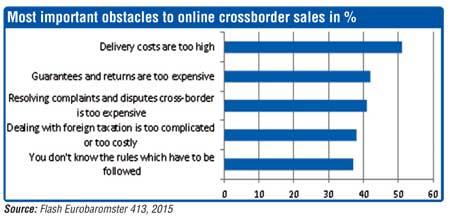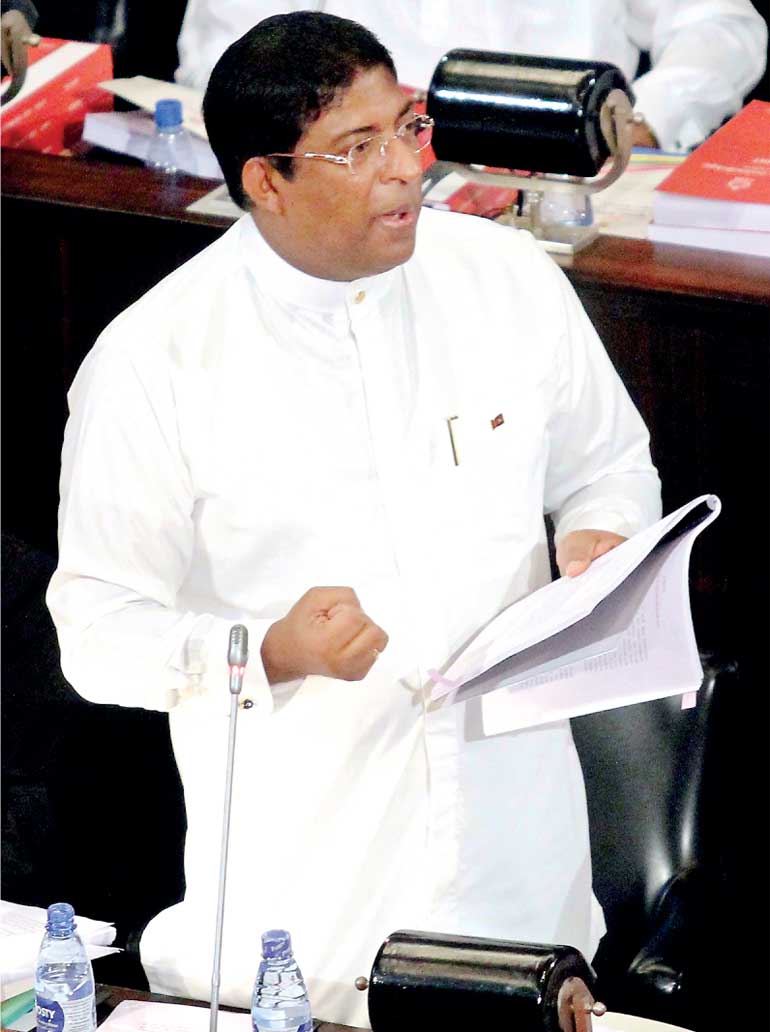Sunday Mar 01, 2026
Sunday Mar 01, 2026
Tuesday, 15 November 2016 00:01 - - {{hitsCtrl.values.hits}}
Much will be written about the 140-page opus that is the 2017 Budget Speech. I was reflecting on a cross-cutting theme that would capture its essence. What emerged, to my surprise, was centralisation: efficiency-destroying, innovation-killing, impractical and counter-productive centralisation.
The exhibit is para 380:
“We will also establish a Central Procurement Agency, which will procure stationery, office equipment, etc. centrally. It is estimated initially with this Rs. 1,500 million mechanism, the Government will be able to save at least Rs. 4,000 million per annum.”
So for a government department to get a packet of half sheets, forms would have to be filled, calls would have to be made and vehicles dispatched. Anyone who has run a government organisation, as I have, or worked in one, knows how difficult it is to get approvals and concurrences from other government organisations. One has to develop relationships, revive old school friendships  and make follow-up phone calls to prevent other people’s inaction from getting in the way of completion of one’s work.
and make follow-up phone calls to prevent other people’s inaction from getting in the way of completion of one’s work.
Now the Finance Minister wants to extend that dysfunction to the procurement of half-sheets. Next time you want to get something done in a government office, expect excuses beyond the usual “subject clerk is not at the desk”: there is no paper, the printer has no ink, the stapler does not work, etc.
And has anyone thought of the impacts on traffic congestion? I recall authorising the purchase of a three-wheeler just to ferry documents between my office and other government offices back when all we had to move were documents. If the new Central Procurement Agency is created, three-wheelers would not be enough.
Has any thought been given to the National Procurement Commission, whose function is set out in Article 156C(1) of the Constitution as that of “formulat[ing] fair, equitable, transparent, competitive and cost effective procedures and guidelines, for the procurement of goods and services by all government institutions”? It’s one thing if the Finance Minister’s pet agency makes the commission redundant but that would require a Constitutional Amendment. Won’t it be simpler to withdraw the Finance Minister’s proposal? Or leave it unimplemented like many of the proposals in his 2016 Budget?
Exhibit is para 366 of the budget:
“At present, there are several funds operating under various departments, and statutory bodies. For better cash management, I propose all funds, excluding the retirement and pension funds, to be transferred to the Consolidated Fund with immediate effect. The General Treasury will release such money as and when required on request.”
It is customary for independent, sector-specific regulatory agencies to have a separate fund. The agency is operated with fees and other payments from the entities that it regulates that go into this fund. The principal rationale is insulation from pressure that could be exerted by the Government which could use disbursements from the consolidated fund as a carrot or a stick. The other, weaker, rationale is that paying salaries from money raised outside the consolidated fund would allow payments higher than government and would therefore serve to attract higher-quality employees.
Apparently, the Finance Minister does not believe in independent agencies. And as shown by his interventions on the minutia of  telecom policy such as network coverage by specified mobile technologies (para 465) he wants to exercise pressure on regulatory agencies on matters that they, or the relevant subject Ministries, are statutorily responsible for.
telecom policy such as network coverage by specified mobile technologies (para 465) he wants to exercise pressure on regulatory agencies on matters that they, or the relevant subject Ministries, are statutorily responsible for.
The regulatory agencies responsible for telecom and public utilities are under the President and the Prime Minister, respectively. The surreptitious effort to expropriate even their funds shows the scale of the Finance Minister’s centralising ambition.
This is not to deny there is room for improvement in the management and accountability of these funds, especially after Rs. 600 million of the TRC’s money was spent on silredi distribution during the 2015 Presidential Election. The Telecom Regulatory Commission is governed by an archaic law dating from 1991 that is in urgent need of total overhaul, including, but not limited to, the financial safeguards for its over-large fund.
When advising governments on the design of regulatory agencies, I have emphasised the importance of transparent budgets and work programs. Amounts in excess of a specified percentage above the approved requirements should go to the consolidated fund, leaving no room for silredi temptations. But never would I recommend that regulatory agencies should go hat in hand to Treasury to get the funds required for their operations, knowing that even absent mala fides, Treasury is routinely short of cash.
Expropriation of funds from entities such as state universities which do not perform regulatory functions is harmful for a different reason. The current University Grants Commission is working hard to create space for the universities to differentiate themselves through the offering of innovative programs. These innovations are supported from internally generated funds such as earnings from for-fee post-graduate programs. Expropriating such funds will harm innovation.
The independence of regulatory agencies must be safeguarded and the space for innovation in the public sector expanded. It is hoped that the relevant ministers including the President and Prime Minister will see the dangers of this proposal and curb the overweening ambition of the Finance Minister.
Exhibit is para 519 of the Budget Speech which lays out a statement of startling ambition to centralise not just functions and funds of government as above, but of digital commerce transactions involving thousands of buyers and sellers.
With the development in technology, online transactions have now become very popular. This has become a method to bypass the formal taxes and charges that is otherwise applicable in trade and financial transactions. This results in significant revenue leakages to the Government given that taxes are not properly charged at the points of port, airport and the post office and courier services when such goods enter the country. As such, ICTA will create a common platform to facilitate online firms such as amazon, ebay, etc. to be able to collect taxes on behalf of the Government for transactions carried out within Sri Lanka. This common platform will be monitored by the General Treasury.
The identified problem is simple enough: a “bricks and mortar” supplier located in Sri Lanka is liable to collect VAT or other relevant taxes for certain transactions, while a digital commerce vendor located outside the country engaged in the identical business is not. How can the “playing field” be levelled in favour of the domestic, tax-paying vendor? How can this be balanced with the objectives of promoting digital commerce?
Sri Lanka is not the first country to face this problem. But it is the first country to ask a poorly performing government ICT agency to create a common platform and hope that all international digital commerce vendors start using it.
It is worth looking at how the European Union, which seeks to create a digital single market by removing barriers to cross-border digital commerce, has sought to address this problem. With digital commerce already amounting to 7% of retail sales (both the base and the percentage being magnitudes higher than Sri Lanka), the EU would have significant leverage over digital commerce vendors who could not afford to stay out of this massive market. Was the solution a “common government platform” that would be operated by Government? No.
Instead, the EU has come up with a legal framework which operationalises the principle that tax revenues should flow to the relevant government where consumption occurs in a manner that minimises costs and burdens to vendors. They have consulted with vendors with experience and those who wish to commence digital commerce and paid attention to what such firms have identified as obstacles:
Will not concerns about not knowing the rules and the taxation procedures being too complicated be even more significant in our country which is 110th in the Doing Business ranking? And will not the tolerance of international vendors for idiosyncratic solutions be low, given how small our market is?
The Prime Minister, in his Economic Statement, did not state that he would block digital commerce activities of international players to placate a few domestic interest groups. What he said is: “We plan to foster entrepreneurship opportunities in digital commerce.” That can best be done by careful study of the experience of other countries which have gone further along the road of digital commerce, adaptation of those solutions on a pilot basis, assessment, and then careful implementation.
In sum, would it not be better if the Finance Minister were to focus on balancing the budget rather than do active harm through counter-productive and impractical centralisation?
